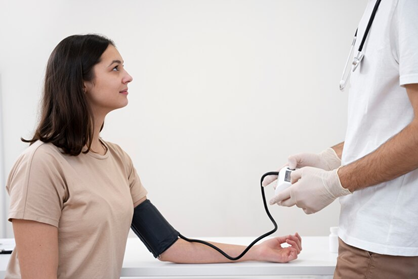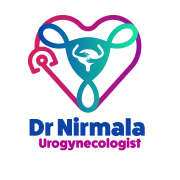A medical condition characterized by high blood pressure and elevated protein levels in the urine occurs soon after childbirth. This condition can develop up to six weeks following delivery.
Understanding Blood Pressure Levels:
- Normal: 120/80 mmHg
- High: 140/90 mmHg
- Emergency: 160/110 mmHg or higher
Signs and Symptoms of Postpartum Hypertension
New mothers should be vigilant for the following symptoms of postpartum hypertension:
- Blood pressure readings of 160/110 mmHg
- Severe headache
- Presence of protein in the urine
- Reduced urination
- Rapid weight gain
- Visual disturbances, such as seeing spots or blurred vision
- Abdominal pain, nausea, or vomiting
- Swelling in hands, face, or feet
- Difficulty breathing or shortness of breath
Risk Factors
The exact cause of postpartum hypertension is not well understood, but several factors can increase your risk:
- Obesity: Being overweight (BMI > 30) raises the risk of developing high blood pressure after childbirth.
- High Blood Pressure During Pregnancy: Developing hypertension after 20 weeks of pregnancy (gestational hypertension) can elevate the risk.
- Personal or Family History: A history of postpartum hypertension in previous pregnancies or within your family increases your likelihood of the condition.
- Age: Women older than 40 or younger than 20 are at a higher risk.
- Multiple Pregnancies: Carrying twins, triplets, or more can increase the risk of postpartum hypertension.
- Diabetes: Diabetes during pregnancy can raise the risk.
Diagnosis
Diagnosis typically involves:
- Monitoring blood pressure
- Conducting blood tests to assess platelet count, liver, and kidney function
- Performing urinalysis to detect protein levels
- A brain scan if seizures are suspected
Management
Postpartum hypertension can be managed with:
- Blood Pressure Medications: To lower blood pressure levels.
- Antiseizure Medications: To prevent seizures, a common complication.
- Anticoagulants (Blood Thinners): To reduce the risk of blood clots.
Breastfeeding can continue while managing postpartum hypertension.
Complications
If untreated, postpartum hypertension can lead to severe complications, including:
- Permanent damage to the brain
- Fluid accumulation in the lungs
- Stroke
- Blood clots
- HELLP syndrome (hemolysis, elevated liver enzymes, and low platelet count)
Preventive Measures
For those at high risk, doctors may:
- Discuss signs and symptoms of high blood pressure
- Recommend low-dose aspirin for future pregnancies
- Encourage an active lifestyle with a healthy diet
Timely consultation and treatment are crucial for managing postpartum hypertension effectively.



